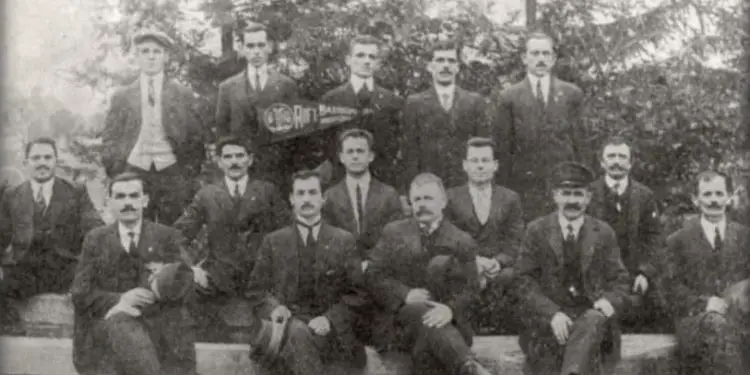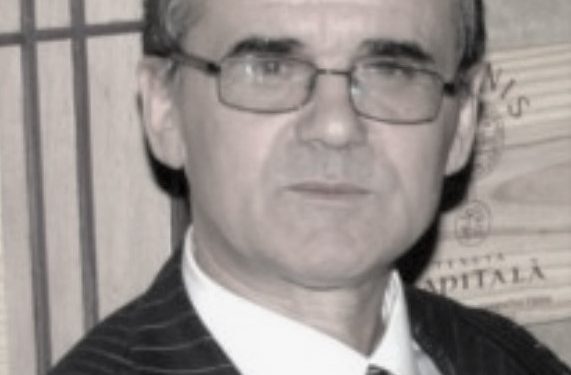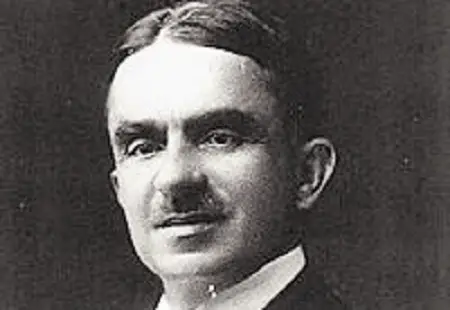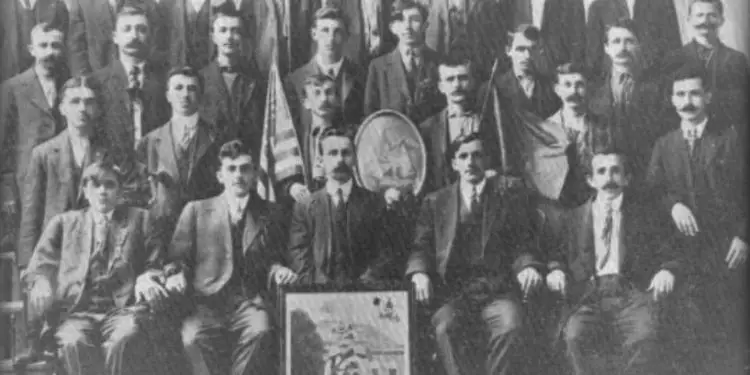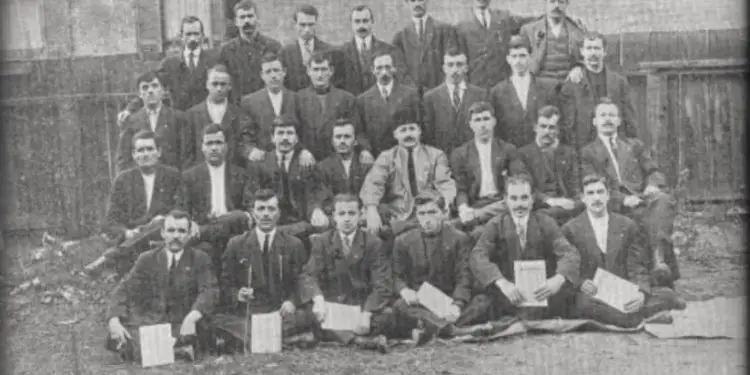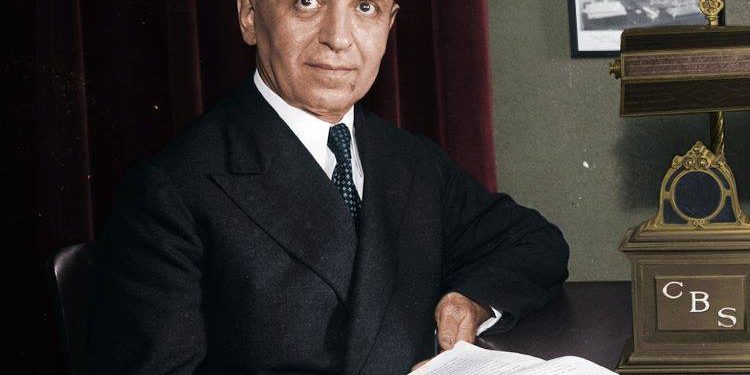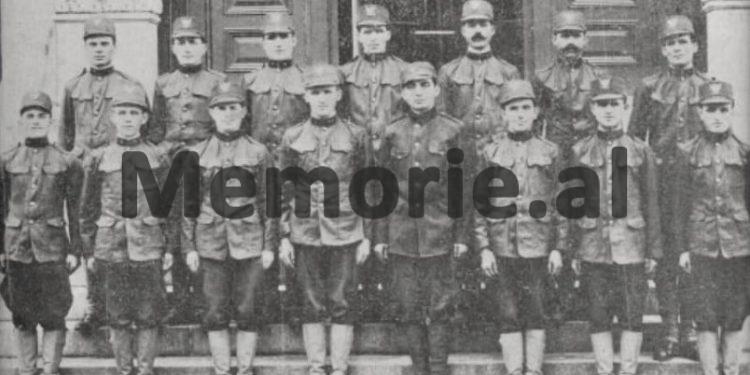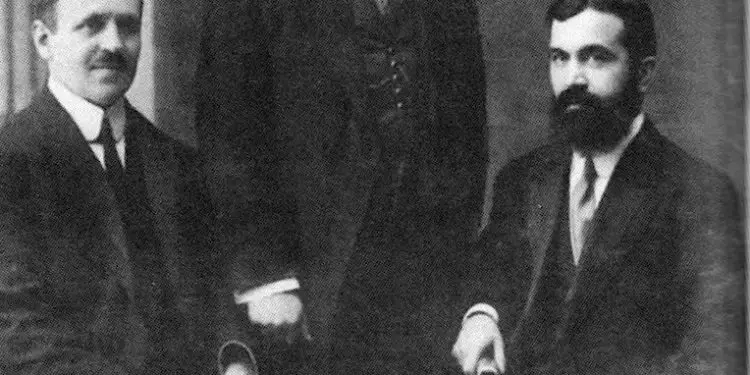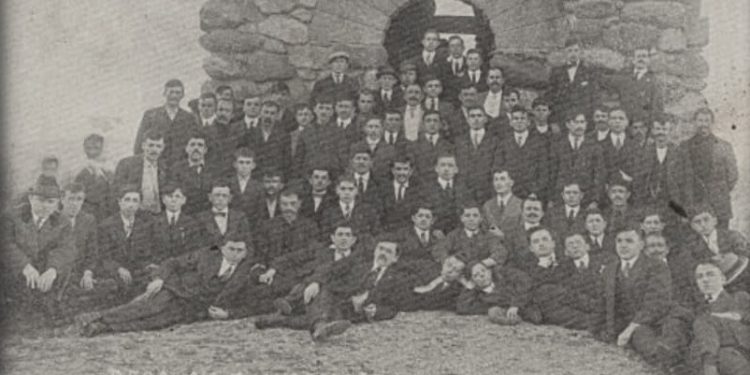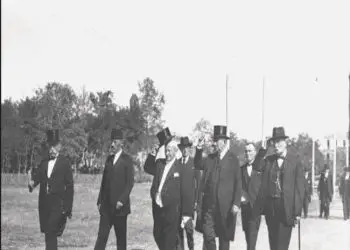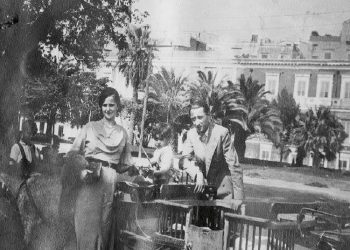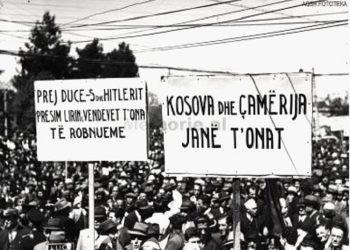By Dalip Greca
Memorie.al / Lawyer, judge, minister, publisher and author of tragedies and comedies, outstanding patriot…! This was Kristo Floqi, one of the most important personalities of Albania in the first half of the last century. What more could he do for his country, a man who had sacrificed a lot to get an education and then to serve the country in many fields. But his end was tragic. Kristo Floqi was arrested by the communists as soon as they came to power, declaring him guilty as the author of the anthem of the Kingdom. Kristo Floqi was imprisoned from 1945-1950. Abandoned, despised, lonely, he died in misery in 1951. No one spoke of his death, not even in the newspaper he had run. Below, we present an article published in Dielli newspaper, dedicated to the activity of Kristo Floqi.
Pat was born on May 24, 1876, in Korçë (it is written that he was born in the village of Floq, but this is not true, because he himself in his autobiographical notes claims that he was born in Korçë.) His father, Vasili, was born in Floq. Researchers Robert Elsie and Hasan Hasani also provide information about Floqi, while journalist Fiqiri Shahinllari, in his book “Oak on the Rock”, brings interesting information about Floqi, after browsing the archive. While Prof. Dr. Stilian Adhami, in addition to the study of this figure, brings rare data and evidence. Kristo Floqi was the son of Vasil Floqi, who had four sons and one daughter; Dhimitri, Kristo, Nikollaki, Thanas and Katerina. Only Kristo and Thanas remained alive.
Both studied law. Kristo Floqi took his first lessons in Korça, while he completed his high school and high school studies in Greece. He graduated in Law in Athens, practiced the profession of lawyer there, until 1900. Then he went to Korça, where he opened a law office, then moved to Vlora. He mastered several foreign languages and stood out from his youth for his literary and journalistic inclinations. The political, legal, literary and journalistic activity of Kristo Floqi includes Albania and the USA. In the time before the war, he shone, after the war, he went through an ordeal of suffering and oblivion, while after his death, it was ignorance for this national figure, covered with the dust of oblivion and, terr.
FROM VLORA TO USA
It is written that Kristo Floqi came to the USA from Turkey, where he had gone to acquire Turkey. Another version is written, that he had arrived in the USA, for economic reasons and the needs of the National Movement, as Petro Nini Luarasi, Sotir Peci, Fan Noli, Faik Konica, Mihal Grameno, Kristo Dako and others had gone. Neither one nor the other stays. The real version, he himself shows, in “Historical Memories” – Formation of the Pan-Albanian Federation “Vatra” – published in November 1937 in the magazine “LEKA”.
Kristo Floqi, in 1009, was a lawyer in Vlora. It is the time when he has affirmed himself among the nationalists who are looking for a separate Albania. This was the cause of a fight between a group of Albanian nationalists, the main one being Kristo Floqi, and a group of Turkish jokers, who were part of the Turkish nationalist society, called “Itihat Ve Tereki”, which propagated a new Turkey. The two groups clashed peacefully, and the local government authorities “brought their souls down their throats”, as Kristo Floqi recalls, in the historical notes published in 1937, in the “Leka” Magazine.
In these circumstances, the group of Albanian nationalists thought that the opportunity had arrived to show the country to the Turks and as a first step, they attacked the office of the Post-Telegraph in Vlora. At that time, Ismail Qemali was in Thessaloniki. The group of nationalists came into contact with Ismail Bej Qemali and all those who were for the National initiative, inside and outside Albania, and presented the situation where Vlora was located and their actions. Being the owners of Post-Telegrafa, they started exchanging numbers, conveying the aggravated situation and what they could do in that situation. They stopped all telegraphs that local officials tried to send to their superiors.
The military authorities were extremely angry and surrounded the Post Office, demanding the delivery of the Post Office, but the Albanian nationalists objected and did not even hand over the code. The situation worsened and military forces were increased. In these circumstances, the Albanian rebels left the Post and a part crossed the sea and jumped across the Adriatic, while another part climbed the mountains. Kristo went to Cakran in Fier, under the care of Bektash Cakran. However, even there it was difficult to stay long without being noticed. They decided to leave Albania and go to Brindizi, where they took the ship to the USA.
FROM BOSTON, TO SALT – LAKE, UTAH
After a few days, Kristo Floqi arrives in Boston. There was no question of practicing the profession of lawyer, as soon as he set foot in America. They decided to open a restaurant in Boston, taking advantage of the Albanian clientele, which consisted mainly of factory workers in Natick, Mass. Just when everything seemed to be going well, the restaurant showed signs of bankruptcy. After four months, they were forced to quit that job. What did they do?
We don’t know what other work Christo might have done with his friends, with whom he took the road to this side of the Atlantic, but he himself writes in his memoirs that; “necessity forced us to leave the United States of America and settle in the beautiful city of Salt-Lake City, in the state of Utah, near California.” In Salt-Lake, Kristo had his brother-in-law, Kristo Poçi, who was in business and things were going well. He worked there until September 20, 1911, after he received an invitation from the “Besa-Besa” Society to take the post of editor of the “Dielli” newspaper, a post which was vacant, after he had released Eftim Natse, before whom in that post, it had been Konica.
EDITOR OF “DIELLI” NEWSPAPER
“Besa-Besë” society was looking for a new editor for its “Dielli” newspaper. With the proposal of Kola Rodhe and Llambi Cikozi, this position was proposed to Kristo Floqi, who at that time had fixed the financial problems and the profits were going well. Although the payment that was proposed to him was not who knows what, 50 dollars a month, he accepted the task, for the sake of the national issue and the unification of the Albanian colonies in the USA. Through the newspaper, Floqi called on Albanians to come together, because in this way they would better serve the nation and influence the creation of the Albanian state.
The impressions of that day, when Kristo Floqi took office, are described with nostalgic notes by the newspaper “Dielli” in the fall of 1911: “Last Sunday, on the 17th of autumn, mass was held in the Church of St. George in Boston, from Per. Father Naum Çere and Father Damianit. There were many Albanians from Boston and the surrounding villages. Father Naumi, celebrated Mass very nicely with his wife, complete and prosperous. As the Gospel was said, Father Damiani gave a short but beautiful speech, translating the Gospel and speaking on the national issue. After the priest, the vice president of the “Besa-Besa” Society, Mr. Vangjo Mille, got up and with a good word, recommended the new director, Mr. Kristaq Floqin, who was received joyfully, with an effort of unbroken hands, by the audience.
Then, Mr. Kristo Floqi stood up, taking in his hands the crown of the “Besa-Besë” society, as well as the other two crowns of the Arsimi society and of the Albanians of Cochituate, so beautiful all three, he held a long speech, more than an hour, where he appreciated the value of the brave boys, who one after the other, fell martyrs for the honor and fame of the Motherland. The director’s speech was so beautiful, high and fabulous in feeling and fantasy, that it made the whole people sad and their hearts clenched, until they wept with tears.
After Mr. Kristo Floqi, the well-known patriot Mr. Kristo Kirka, who spoke with great heat about the murderers of the East, burning the burnt hearts? A strong effort of hands proved the joy felt by the listeners. Finally, with very elegant and well-liked words, he recommended our director to the people, saying that; from men like Kristaq Floqi, the nation should expect a lot. The Albanians of America should feel them unsparingly in the new path, in which he wants to bring the Albanians and the Nation. Thus, the mass was performed, leaving an unforgettable commemoration”.
He did not just stay in the office, but went to where the Albanians were, inn to inn; village to village, town to town. He held conferences and encouraged Albanians for patriotism. The purpose of the conferences was the unification of all the Albanian colonies, in order for the Albanians of America to have a united voice for their nation. At that time in America, there were several Albanian societies such as: The largest was the “Besa-Besë” Society, then came the “Arsimi” of Korçar, the “Swallow” of New York, the National Society of Orcester, the Society ” Malli i Mëmëdheut” and the Birth of Jamestoën, the Lihda Society, the “Gjergj Kastrioti Skënderbeu” Society, the “Hylli Afërdita” Society, the “Bashkimi” Society, the “Mirebërèse” Society, the “Progress” Society and the Committee of Mr. Faik Konitza “Flag of Kruja”.
In the conferences that he held in the Albanian colonies, Kristo Floqi put forward the idea of a common program of united societies and the end of provincial disputes and localisms. He argued that only united, they would manage to strengthen the national spirit in the USA. Floqi managed to visit the Albanian colonies for three months and held more than 100 conferences. When he saw that the seeds of union had been sown, and that some of the societies were convinced that it was time for union, he sent out the call for a joint meeting.
THE HISTORICAL MEETING OF DECEMBER 11 IN BOSTON, THE LACK OF THE CONE
By understanding with the societies, it was decided that the first meeting would take place on December 11, 1911, in Boston. That day, hundreds of Albanians arrived in Boston and it is precisely this day that opened a new era for the Albanian National Movement in the USA. In his memoirs, Kristo Floqi writes, “The historic day of December 11, 1911, marked a new period for Albanians in America. That day, they arrived in Boston with hundreds of Albanians, as delegates of societies, but also individuals. The wide hall of the ‘Rathbonne’ lobby was full, so many people were forced to stand and hundreds of others remained outside.
Bishop Noli also took part in the meeting. The absence of the “dean” of the National issue, Faik Konica, who was undoubtedly the most elite figure of that time and one of the promoters of the National Movement, was noticeable. His articles in “Dielli” were made for themselves by the Albanians of America, while the representatives of various societies who came to that historic meeting were surprised that the pillar of unification was missing there. The curiosity of the delegates was seen by Kristo Floqi, who showed them the letter he had received from Faik Konica and read it word for word. What did Konica write in that letter? We bring it in full:
Dear Mr. The hair
I received your letter this afternoon, and return my compliments for the words of friendship and respect you say to me. Unfortunately, I’m totally stuck on Sunday, because I didn’t know you had a meeting and that you were going to invite me, so I connected elsewhere for the day after tomorrow. What you tell me about the union is appreciated, and without a doubt, a fair formula should be found, so that we can finish without spoiling the works that we have dealt with so far, with a lot of effort. We have our own committee here (“Kruja Flag”) and we see no reason to break it. It is good to destroy works without order and without a program, but not works built with care. I trust you to weigh these and give me the right”.
I remain faithfully yours,
Faik Konitza d.v
The letter seems to have left a taste of disbelief in those present. Kristo Floqi himself writes that this letter was an excuse not to come, since the announcement of the unification meeting was published in every issue of “Dielli” and the newspaper was sent to Faik. But now that he was no longer the editor of “Dielli”, when they asked him about the newspaper, he said without hesitation that he no longer read “Dielli”, for fear of forgetting Albanian! According to his interpretation of the letter, Kristo Floqi suspects that Konica sent the letter and did not go to the meeting himself, because he was not the initiator and did not want to sacrifice his “Flag of Kruja” Committee, which according to Floqit, there were only 10-12 members. Floqi writes in black on white: “Konica did not want me to take the flag of the union.” Both this and Noli always threw obstacles. The Albanians of America had understood this and I especially dictated to them from time to time through Dielli, our organ”.
In fact, Fan Noli replied to Kristo Floqi, that he and his friend Konica were not against the union, on the contrary, they had worked for a long time for the union, but they were looking for a pleasant and serious job, not funny. (“The Sun”, January 18, 1912). For his part, the former editor of “Dielli”, Refat Xh. Gurazezi, in the cycle of articles about the history of “Vatra”, summarized in the book “Historia e Federazione ‘Vatra”, contradicts Floq, about whom he writes: “The last editor (as much as “Dielli” was a good newspaper. “Besa -Besë”, he found the discussion table, the idea and the plan for the unification of all the Albanian societies of America, around a great national society”.
FLOQI, CHAIRMAN OF THE HISTORICAL MEETING
In his memoirs, Kristo Floqi claims that in order to respect Monsignor Noli, he proposed him as chairman of the meeting, but Noli rejected him with the argument that Floqi was entitled to that position, because he was the initiator and organizer. Noli’s proposal was put to a vote and Kristo Floqi was elected chairman, while Llambi Kreshpani, secretary. After the speeches, Marko Adams proposed the historical commission for the establishment of “Vatra”, where he listed four names: Fan Noli, Kristo Floqi, Faik Konica and Paskal Aleks. According to the proposer, this commission would undertake the organization of a large Pan-Albanian Federation, in agreement with all societies.
The proposal was approved. The burden was left to the Commission, which at the first meeting, elected Fan S. Nolin as secretary. Each association was notified to send the name of its delegate to the center. Floqi remembers that the first record, announced by the commission, was: The four signatories, chosen by the Assembly, as a Commission to find the way to unify all Albanian societies in the USA, gathered and decided: 1- To be asked all other societies and colonies, where no societies exist, if they like a general union.
How do they want the union, centrally, or as a federation? With what purpose do they want it, political, literary, or popular propaganda? In case they like this union, when they may choose their delegates, to come to Boston and establish the union. At the same time, it was announced that the Committee of the four chose Rev. as secretary. Father Fan Nolin, with address; P.O Box 2445, Boston, Mass, to whom correspondence should be addressed. The next meeting was to take place on March 3, 1912. Below the announcement, four names were placed, which have already entered history: Faik Konitza, Kristo. Floqi, At Fan Noli, Paskal Aleksi.
Afterwards, he recalls that the delegates, full representatives, were also elected: Llambi Čikozi for the “Besa-Besë” Society, Father Naum Čerja for the “Mirebërse” Society, Kostika Treska for the “National” Society of Orcester, who was replaced by Kosta Vasili, for the Society “Përlindja” and “Malli i Mëmëdheu” of Jamestoë, Kostaq Kota, for the Society “Dallandyshja” of New York and “Aresıni”, Kristo Kirka and for the “Flag of Kruja” Committee, Kolë Tromara. In the meeting of March 24, 1912, Floqi remembers that; the decision was made to draft the Canon. After all these actions, a name was needed to christen the Federation.
Floqi remembers: “Each of us, organizers and delegates, proposed a name, some “Plugu”, some “Parmenda”, another “Kastrioti”, another “Skenderbeu”, someone “Prilindja”, but none of them, found everyone’s approval. Then Fan Noli threw the name among the participants; “Heat”. We saw each other eye to eye; not that the name was bad, but as if it didn’t hit our ears well, but Fan Noli, with his eloquence, gave us some clarifications and other significant explanations and, thus, he convinced us all and we accepted him with cheers and applause”.
Konica, in an article published in “Dielli” on March 31, 1922, opposes this representation of Floqi, when he writes: “I am responsible for the name, federal, canonical form, regulation, and the first spirit of ‘VATRA’. But the truth is that the Hearth, which I left behind for seven months, grew, grew, became a force from Fan Noli and the Hearths of America, in 1915-1919, and in that development, I I didn’t have any part”. Then, the Canon was drawn up, which was signed by everyone.
APRIL 28, HISTORICAL DAY
Floqi remembers that April 28, 1912, was a historic day. He writes: “The day of April 28, 1912, was the last day of talks about ‘VATRA’ and this day can be called “the historical day of the creation of ‘VATRA’, which served the Motherland so much, in the dangerous times that followed later, truly patriotic services, which can never be forgotten.” This day is fixed in Record XI, which contains the election of the Eldership of “Vatra”. They were chosen as elders; Fan Noli, Llambi Cikozi, and Kristo Kirka. Faik Konitza and Kristo Floqi were chosen as organizers for the formation of the branches, as controllers Paskal Aleksi, Elia Tromara and Kosta Vasili. The most difficult task met the two organizers who had to go from colony to colony and form the branches of Vatra. Floqi, it seems, was not satisfied with the selection made by Faik Konica, who according to him, chose those colonies or societies where the numerical presence of Albanians was large, while he left the villages to him, Kristo Floqi.
Perhaps with subjectivity, he also complains about the intermediary role of Noli, who favored Konica. Floqi, remembers that Konica, chose to create branches in; Lynn, Orcester, Manchester, Southbridge and Central Falls. Fan Noli, as a friend of Konica, offered his assistance, and undertook to organize branches in Boston, Natichk, and Cochituatet. Kristo Floqi’s branches remained; Milford So, Framingham, Marlboro, Hudson, Taunton, Ne Bedford, Bideford Me, Saco Me, Lewiston, Sanford, Augusta, NH, Concoder N.H. Franklin, Penacook and several other smaller ones. Refat Gurazezi opposes Floq on this point as well.
LEAVING
The temporary committee of “Vatra” held its first meeting, after its establishment on July 2, 1912, at Simonds Hall, and there the decision was made to organize the First Assembly, on Sunday, July 14, 1912. The meeting decided to participate in the Assembly also members, who would be determined by the secretaries of the branches, but they would only be listeners. This same meeting assigned the task to Faik Konica to prepare the seal of the Federation, Llambi Çikozi, had undertaken to order the buttons with the F.S.V. monograms, and Kristo Kirka, and had undertaken the publication of the Canon, in the Albanian language.
The first assembly took place during the day, even though it started at 1:00 in the afternoon. They were chosen there; Faik Konitza, general secretary and Editor of “Dielli”, Llambi Çikozi, general treasurer, Kristo Kirka, Manager of “Dielli”, Kristo Floqi, Paskal Aleksi, Vangjel Gjika and Josif Pani, controllers. Before the month had passed, disputes between the officials of “Vatra” began. To restore normality, the three controllers, Kristo Floqi, Paskal Aleksi and Vasil Gjika, were removed. On August 11, Fan Noli, Andrea Kristo and Koli Caknaqi were elected instead. Kristo Floqi, got angry and went to New York, where he started publishing the newspaper “Zëri i Populli”.
FLOCI, WRITER, LAWYER, POLITICIAN
After returning to his homeland, Kristo Floqi devoted himself to law, literature and politics. In 1919, he ran the monthly “Agimi” in Shkodër, where he also opened his own law office. On September 19, 1920, for a few months he was Minister of Education in the Cabinet of Iliaz Vrioni. In the first legislature, April 21, 1921, he was a Member of Parliament. He also served as the judge of Dictation. Floqi also stood out in the field of literary and journalistic creativity. His poems were full of enthusiasm and sang to the homeland, the martyrs, the beautiful nature; they evoked bravery and Albanian traditions. Even in the 1920s and 30s, his poems were part of the lyrics of Singing.
Its volume; “Skëndija or School Anthology”, included 105 poems, elegies, and fables. The elegies dedicated to Naim by Sami Frashëri, Themistokli Gërmenji, Gani Butka, Spiro Bellkamen, Papa Kristo Negovani, Ceno Sharra, Meleq Frashëri, Mustafa Qulli, Çerçiz Topulli, Baba Dudë Karbunara, the Dutch Colonel, Tomson, etc., were among the most popular and they were recited during holidays or commemorations. Floqi was one of the prominent playwrights of his time and ranks in the history of Albanian drama production, alongside Sami Frashër, Mihal Gramenos, Noli, Foqion Postoli, etc.
Floqi’s favorite drama was; “Religion and Nation”, which was performed by many theater companies in the 30s. The dramas “Pyrrhus of Neoptolemy”, “Karl Topia”, “Skenderbeu in Italy”, “Cyprus” etc. belong to him. He was also a quite successful comedian. Kristo Floqi has also distinguished himself in the field of studies. He has published a number of texts, with a political and legal, historical and ethnographic character. Mention: “The fundamental right”, “Elements of political economy”, “A sermon on patriotism and nationalism”, “Kosovo-Old Serbia” – Ethnographic study, where he contradicts with facts, that Kosovo is not Old Serbia. Memorie.al




